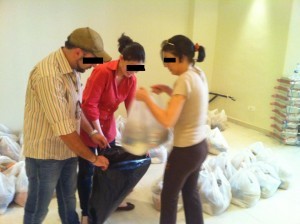Aleppo’s Female Activists Struggle to Overcome Prejudice

Rasha Rami
Since protests began in Syria in March 2011, female activists have played a significant role, both by taking part in demonstrations in the early phase of the uprising, and by carrying out humanitarian work.
In addition to the security threats they have faced, female activists have often had to struggle against conservative social norms and even harassment.
Natalie, 27, says that from an early age, she has been standing up to the conservative traditions that restrict female participation in public. When she helped organise demonstrations in Aleppo in 2011, she worked alongside men whose social class and religion differed from hers, and with whom she never thought she would collaborate.

“With a number of activists who had fled from Homs and Idlib to Aleppo, I agreed to organise demonstrations so that Aleppo would catch up other Syrian provinces,” Natalie said. “We started mobilising protesters in the Salaheddin and Al-Sukkari quarters. My job was to write banners while the men set up loudspeakers, podiums and revolutionary flags. But I never hesitated to grab a hammer to put up a podium, or to cheer, sing and hold hands with other demonstrators.”
During this time, Natalie was detained by Syrian security forces for 21 days.
“In detention, I didn’t [feel bad because] I was a woman, even though the interrogators kept humiliating me by saying the only thing I should do in life is to have sex with them and other men, because I was morally degenerate,” she said. “When I was released, I told my story to many of the girls who later worked with me to deliver humanitarian aid. I tried to make my story as interesting as possible so that they wouldn’t be afraid of taking part in the revolution.”
After members of the security forces repeatedly threatened to lock her up for life, Natalie fled to Damascus. Her role in the uprising is now limited to contributing to pro-revolution social media forums.
In August 2012, peaceful demonstrations in Aleppo were replaced by fighting between regime forces and the Free Syrian Army, FSA. This left Aleppo’s population in need of humanitarian aid, after the city had itself offered refuge to people displaced from other parts of Syria.
Volunteers used the scant resources available to them to accommodate displaced Aleppo residents in schools and university accommodation.
The volunteers included many young women who later had to stop their activities because of the social opprobrium they attracted. Many others, however, continued working against all the odds.
Dalia, 23, was never tempted to get involved in politics, and was committed solely to humanitarian work as a volunteer in the Red Crescent organisation in Aleppo.
Dalia believes in the organisation’s values, especially its neutral stance. She never hesitated to go to the Salaheddin quarter to help wounded combatants from either the regular army or the FSA, nor did checkpoints stop her entering the Hananu neighbourhood to evacuate civilians.
Dalia currently works in one of the Aleppo schools that have been turned into a refugee centre, defying the negative view that some men attach to her activity.
“When I first started working at this school, many displaced men wouldn’t accept the idea of receiving aid from a girl,” she said.
Dalia was not put off by this.
“Once I asked a man living in the school to help me with the daily chores. He refused, saying he wouldn’t take orders from a woman. I then asked the other members of the team not to offer him or his family any help. It was important that he should recognise we were risking our lives to provide him with the security that other men would deprive him of.”
The problems facing Dalia and her female colleagues go beyond uncooperative attitudes. Many men unused to dealing with working women have sexually harassed female aid workers, Dalia says.
“Not only did displaced men say indecent things to the girls whenever they passed by, they would also pretend to help them and then touch them,” she said. “Those girls were forced to go and work at another school. Men who do such things are reprimanded by the aid centre administration and can face expulsion.”
